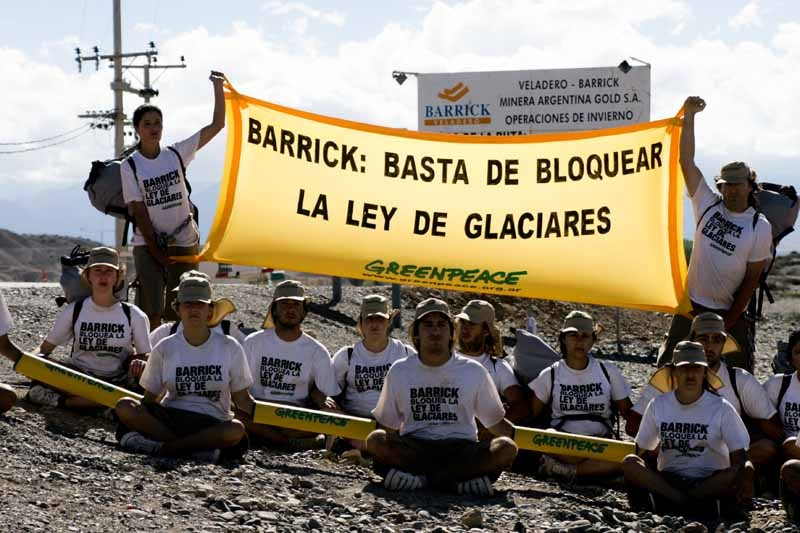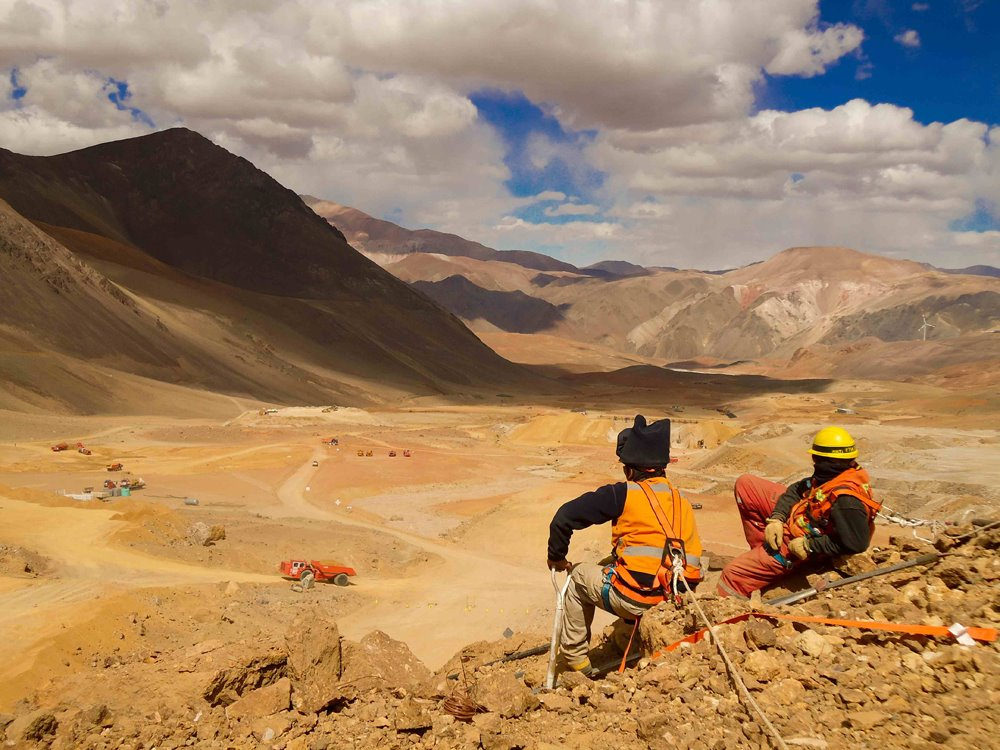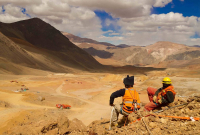Canadian mining giant Barrick Gold is once again in hot water in Argentina.
A federal judge in Buenos Aires is considering whether to order the permanent shut down of the Toronto-based resource company’s Veladero gold mine in the South American country in the wake of a third toxic cyanide spill in less than two years.
The latest incident was triggered after a pipe carrying a cyanide solution ruptured on March 28 at the site of the open-pit gold mine.
Barrick Gold spokesman Miguel Martin said the company contained the spill on site “without putting the environment or public health at risk.”
He explained that the company is working on plans to improve its operations, in collaboration with the province of San Juan, in order to prevent it from happening again.
But for federal Judge Sebastian Casanello, enough is enough.
In an official statement, Casanello said that the series of incidents is forcing officials to consider closing the mine because the facts show that Barrick Gold’s preventive efforts have failed. The judge launched an inquiry in order to review the possibility of formal charges.
In Argentina, judges can play a regulatory oversight role and they have the power to initiate inquiries to enforce environmental laws.
“What’s going on over there is crazy,” said Enrique Viale, the president of an association of environmental lawyers in Argentina and an advisor to the natural resources committee in the Senate.
He explained that Argentinian mining rules also require regulators to shut down a mine after a third serious incident.
The federal environment minister, Sergio Bergman, asked the court to suspend Veladero’s activities temporarily. This action was already taken by the province of San Juan which has jurisdiction over mining — something that has also been noted by Barrick Gold.
“The national department (the environment ministry) doesn’t have jurisdiction over natural resources,” said Barrick Gold spokesman Miguel Martin. He added that Casanello, the judge, also doesn’t have any jurisdiction over the mine.
Glaciers at risk
While Casanello doesn’t have jurisdiction over the management of natural resources, he does have the power to enforce a federal environmental law that prohibits any open-pit mining projects in regions with glaciers. The judge has requested a series of documents in order to make a formal ruling if the Veladero mine falls within this type of region with glaciers.
If confirmed, this could give Casanello the power to order a shutdown of the mine, said Viale.
Bergman, the environment minister, didn’t respond to to an interview request from National Observer. However, in a statement, he said that he had reviewed a report showing that other spills may occur in the future. This type of event could mean danger for interprovincial rivers, groundwater, and the ice cover of glaciers, he said on the basis of the report.
Glaciers represent major water reserves for Argentina. “All of our rivers, our culture, our ecosystems, depend on them (glaciers),” said Gustavo Herrmann, one of the leaders of an activist group called Jachal no se toca (Keep your hands off Jachal).
In the town of Jachal, located near the mine, the locals periodically lose their access to drinking water. The activist group has accused Barrick Gold of contaminating rivers and groundwater with cyanide, arsenic and heavy metals.
And since 2016, more than 270,000 people signed an online petition launched by Greenpeace in Argentina that urgest the president to shut down Veladero. For groups like Jachal no se toca and Me Viale, there is no doubt that Veladero encroaches on a glacier.

Ottawa to name ombudsman
In Ottawa, Liberal MP John McKay told National Observer that Veladero’s detractors will soon have a new option.
McKay, who had previously proposed accountability legislation for Canadian companies operating abroad, said that the Trudeau government is on the verge of naming an ombudsman for the mining sector.
For years, McKay has been calling for sanctions on Canadian mining companies that are involved in illegal activities outside of the country.
“The Trudeau government is working hard” on efforts to name an ombudsman, McKay said. “I would be very upset if it’s not this year.”
McKay had previously told the Hill Times last December that the ombudsman would be created by March.
However, he said that the election of U.S. President Donald Trump shook up those plans.
"All resources have been dedicated to how to deal with Mr. Trump,” McKay said.
He added that an ombudsman could also impose significant sanctions. The company could lose access to consular services from the Canadian embassy. It could also lose any federal financing through government organizations such as Export Development Canada (EDC).
Such a sanction could have a significant impact on Barrick Gold, which received an EDC loan of US$60 million as well as insurance against losses due to political instability.
Global Affairs Canada declined to confirm McKay’s comments about the timing of an ombudsman appointment.
“The government of Canada expects all Canadian companies to respect the law as well as the values of Canada,” said spokeswoman Natasha Nystrom.
There may also be a new stakeholder getting involved with the file. Barrick Gold announced on April 6 that Shandong Gold Mining Company Ltd. will acquire 50 per cent of the Veladero mine for US$960 million and when the transaction is completed by mid year, each company would have three nominees on a joint venture board overseeing the mine.
Barrick Gold spokesman said this new partner has been recognized as a “friend of the environment” by the Chinese government and that 11 of the mines it operates were also certified by the state as green mines in China.
But Viale, from the association of environmental lawyers, says he isn't impressed with levels of Chinese certification.
“We have a lot of concerns about the arrival of the Chinese,” he said. “The Chinese government is much more complex than a private Canadian company, and over there, there isn’t an environmental conscience.”






Comments
We say "Canadian" mining company, but it seems as if Canada is something of a flag of convenience for mining companies, sort of like Panama for shipping. I was surprised and somewhat shocked to learn recently that a majority of the world's mining companies are registered in Canada, and 60% are listed on the Toronto Stock Exchange. It seems Canada gives mining companies something of a sweetheart deal.